Fellowship Program
The Landhaus Fellowship Program has come to a close. We look forward to new opportunities with a new director.
Fellowship Testimonials
Flora Bartlett (UK/Sweden)
The Landh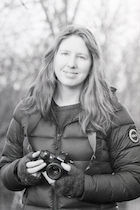 aus fellowship was an extraordinary experience, fostering interdisciplinary thinking and nurturing valuable friendships.
aus fellowship was an extraordinary experience, fostering interdisciplinary thinking and nurturing valuable friendships.
The fellowship allowed me to focus on my own writing projects away from the bustle of everyday distractions. The RCC organised regular events and lectures, giving us the space to present works in progress and meet experienced scholars across different disciplines. There was a good communal working space at the Landhaus itself and the terrace offered a very lovely spot for sunshine basking, coffee, and sharing ideas with the other fellows. Beyond work, the surrounding landscape was really nice for switching off from writing - we cycled, swam in the lakes a lot, even cracking through the ice to do so, and took a day trip to the alps. The nearby forest is a really lovely place to wander about in.
Living communally with the other fellows encouraged interdisciplinary thinking, discussion, and dancing. We were able to share our work and different approaches through both the organised events at the RCC but also in the everyday spaces of living and cooking together. This was a brilliant opportunity to meet people from around the world and share cultures and cuisines, and I made some truly special and lasting friendships.
Subarna De (India)
“[T]he important part of writing is living. You have to live in such a way that your writing emerges from it.” – Doris Lessing
My writing residency at the Rachel Carson Center Landhaus is a sublime experience. The fellowship provides me with a home in the community of other interdisciplinary scholars who help my ideas grow, encourage me to see the world through different perspectives, feel comfortable to share readings and opinions without any constraints, brainstorm perceptions and debate arguments. Altogether, it provides a lot of inspiration to grow as a scholar, writer, and person. Every morning, our breakfast table in the communal kitchen blooms up new meanings to our academic lives as researchers get together to discuss their day’s objectives. The busy lunch breaks initiate intellectual discussions to deconstruct familiarity and provide more enthusiasm to get back to work. In the evening, we lazily retire to our garden for a drink and (often) communal dinner, talking about lighter and more personal tones of life and the world.
It is strange how we meet as strangers. Still, we bond overnight and become a family who endlessly cheers and supports each other, offers advice to make better writers and researchers, and shares problems and finds solutions together. Situated within the organic farm in Herrmannsdorf, RCC Landhaus encourages togetherness in communal living, learning, and dining. Beyond academics, we bond over gardening, long walks, barbeque parties, Friday board games and/or movie nights, communal dinners, hiking the Alps, cherry and strawberry picking, cold swims and rejuvenating saunas. I find this farmhouse provides a rare and unique opportunity that fosters learning through community building, including humans and the more-than-humans. The birds, pigs, goats, rabbits, lambs, cows, chickens, trees and plants become a companion of our daily lived-in-experiences and everyday nature. We wake up to the birds’ songs, meet the trees and the animals during walks, and consume their parts/produce. This fellowship brings me so much love, light and wonder that I believe it is an invaluable experience for writing my first monograph.
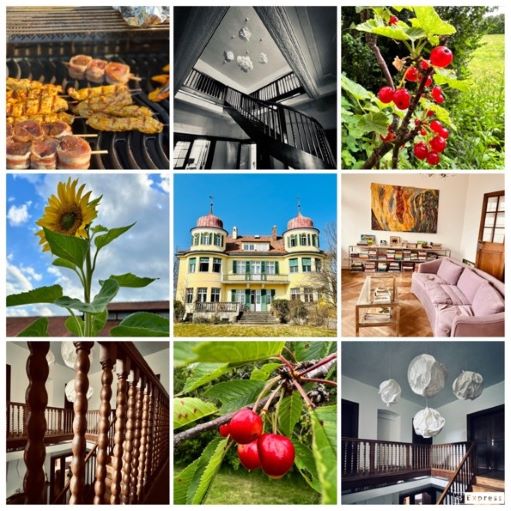
The picture collage (from top left to right): barbeque at Landhaus garden; staircase and atrium; red current in Landhaus garden; Sunflower in Landhaus garden; RCC Landhaus; Living room; First floor; cherry-picking in Landhaus garden; atrium. Photographs by Subarna De.
Etienne Dufour (France)
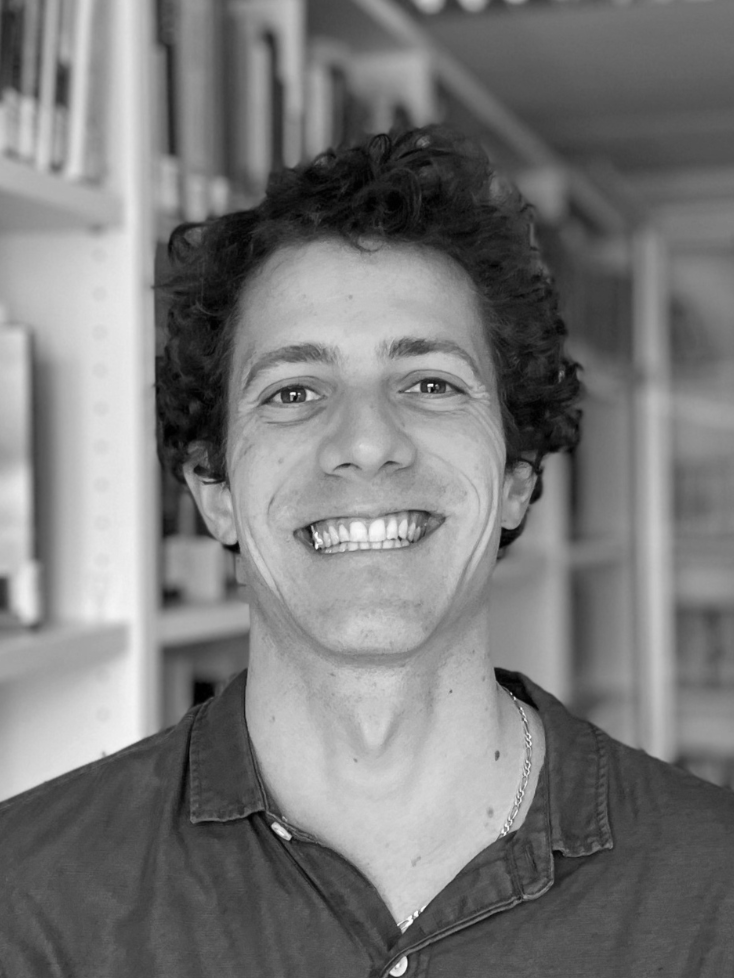 I was a resident of the RCC Landhaus during the spring and summer of 2023. I wrote part of my doctoral thesis there under the best conditions I could have hoped for. It came at the best time for me: free from other obligations, I felt a great need to escape from my routine, and, at the same time, had to concentrate on moving forward in my work. It was a wonderful experience, in which I was able to benefit from the isolation often necessary for writing without suffering from loneliness. The moments shared with the other residents of the house and the people living on the farm, as well as the members of the RCC in Munich where I had numerous and sometimes very beautiful encounters, were invaluable.
I was a resident of the RCC Landhaus during the spring and summer of 2023. I wrote part of my doctoral thesis there under the best conditions I could have hoped for. It came at the best time for me: free from other obligations, I felt a great need to escape from my routine, and, at the same time, had to concentrate on moving forward in my work. It was a wonderful experience, in which I was able to benefit from the isolation often necessary for writing without suffering from loneliness. The moments shared with the other residents of the house and the people living on the farm, as well as the members of the RCC in Munich where I had numerous and sometimes very beautiful encounters, were invaluable.
To share the joy and good fortune I had being there for a while, I selected some photographs taken during my stay. On the days I stayed at the farm, I often took an hour or two to walk or cycle the country paths of the area. It was a way of punctuating my writing phases, in the morning, at lunchtime, or in the evening. These walks, between fields, lakes, and forests, were at once escapes, moments of inspirations, and rewards. On these occasions, I often took my camera with me. The walks were an opportunity for me to discover a small part of Bavaria and to reconnect with a practice I had when I was younger: as a child and young teenager, I often roamed the hills of the region where I grew up, the southwest of France, to take photos of landscapes and wild animals. Doing this teaches patience, calmness, discretion, and delicacy: you need to be able to get close without scaring, to keep the right distance so as not to frighten, to appreciate without touching. In so doing, you learn to see, watch, and respect, and you develop a sense for nature. Around the Landhaus, I was able to pick up this habit for a while again, which I sometimes miss in my daily city life. It was a chance and I was delighted to take it.
Among others, I have chosen to share pictures of birds. Here are a wonderful blue tit, a goldfinch taking a break during a lunch in a blooming chestnut tree, a great spotted woodpecker looking for worms in some dead branches, two finches doing something that was supposed to remain private, a yellowhammer who sings its heart out, a swallow taking a breather while hunting, a kestrel falcon in the light of the setting sun, and more. Besides the RCC, this is my humble tribute to Rachel Carson herself, whose famous alert of Silent Spring is still more and more accurate as our (industrial) times continue to work as they do. This rich biodiversity is a treasure, especially in the agricultural countryside, but it is no longer so common and remains under threat. In addition, because I can't resist mixing images and feelings with the music I have heard and shared with people there, these photos can be looked at while listening to one of my favourite songs: Gli Uccelli (“The Birds”), by the Italian singer and songwriter Franco Battiato. This song always carries me away: it helps to take off and dream a bit. Maybe that is also what the RCC Landhaus can sometimes inspire.
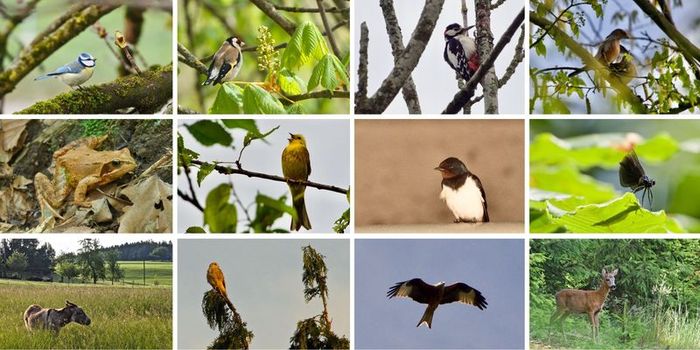
Faisal Husain (USA)
Faisal's testimony consists of two slideshows about the Landhaus, which are linked below under “Video Testimonials of the Landhaus.”
Péter Kristóf Makai (Hungary)
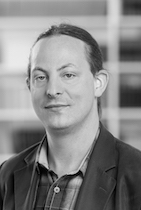 I am extremely grateful for the nine months that I am currently spending at the green cradle of intellect that is the Rachel Carson Center Landhaus. The fellowship has allowed me the freedom and focus to develop my thinking on how video and board games address climate change in an environment that is supportive and which challenges me to clarify my arguments. Beforehand, I have already lived in scholarly communities under the same roof, but there is something in the air around Herrmannsdorf (besides the by now familiar smell of livestock and organic farming) that is congenial to systematic thought. Free of distraction, with the view of the Alps inspiring new ideas every day, we live and work almost as a family unit.
I am extremely grateful for the nine months that I am currently spending at the green cradle of intellect that is the Rachel Carson Center Landhaus. The fellowship has allowed me the freedom and focus to develop my thinking on how video and board games address climate change in an environment that is supportive and which challenges me to clarify my arguments. Beforehand, I have already lived in scholarly communities under the same roof, but there is something in the air around Herrmannsdorf (besides the by now familiar smell of livestock and organic farming) that is congenial to systematic thought. Free of distraction, with the view of the Alps inspiring new ideas every day, we live and work almost as a family unit.
When you come to Herrmannsdorf, you learn to expect the unexpected: one day you might be going on a sledding trip, the next day you take a long walk and run into a peacefully grazing deer fawn. Soon, you find yourself staying up all night, ready to defend a maypole from invaders of a neighbouring village, so that you would not have to buy it back with cratefuls of beer. In Bayern, traditions are kept alive (sometimes to a fault), so every stereotype you have picked up from cultural representations are enacted with a relish, whether it is quaffing beer in Lederhosen to the tune of polka or Schrammelmusik, or playing the horn as the Alpenglow descends. So... also expect the expected, I guess?
At any rate, over time, you will realise that your fellow housemates are your strongest allies and fiercest critics, and probably they will get to know you better than most people you meet in your life. I have already grown as a person, and have opened myself up to new experiences. Also, I enjoy organizing gaming events, I like sharing my culture and delight in receiving novel impulses from the diversity of fellows. Predominantly, this comes through the language of cooking and shared meals, from souvenirs brought home from conferences, and the music we love to cook to. But above all, it is in the incidental conversations, the complaining sessions, the sunset philosophization over a glass of wine that we truly experience fellowship and the free flow of ideas. Who could ask for more on a research and writing retreat such as this?
Jared Margulies (USA)
The Lan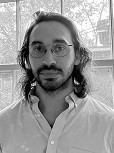 dhaus fellowship was a valuable opportunity to focus on completing my book manuscript within the beautiful rural Bavarian landscape and in the very good company of other interdisciplinary environmental humanities scholars. Herrmannsdorf is a truly unique working farm and is filled with passionate environmental and sustainable agriculture advocates and experts, and made a wonderful setting not just to write, but also learn about ways to live and eat better (and eat very well) in relation to the land.
dhaus fellowship was a valuable opportunity to focus on completing my book manuscript within the beautiful rural Bavarian landscape and in the very good company of other interdisciplinary environmental humanities scholars. Herrmannsdorf is a truly unique working farm and is filled with passionate environmental and sustainable agriculture advocates and experts, and made a wonderful setting not just to write, but also learn about ways to live and eat better (and eat very well) in relation to the land.
The Landhaus itself is beautiful and waking up to a view of the alps every morning was inspiring to say the least! But above all, the most valuable part of the experience was getting live communally with such a thoughtful and diverse group of scholars, all working on their own projects, books, and papers. Sharing meals, stories, and experiences is an essential part of the Landhaus fellowship. We edited each others’ works, provided one another suggestions and guidance based on our own experiences and career stage, and formed lasting relationships that I know will extend well into the future. Sharing living space forces one to quickly develop trusting relationships with one another, and it was remarkable to see how quickly friendships could form in this setting.
The Landhaus fellowship is not only at Herrmannsdorf, but also engages with the much larger RCC community in Munich. The works in progress sessions, weekly colloquiums, and opportunities to engage with other RCC visitors was a wonderful chance to meet and get to know a wide variety of international researchers at different career stages. I would encourage prospective fellows to take advantage of all that the RCC and Munich have to offer in this regard. I am very grateful to have had the opportunity to spend 3 months at Landhaus, and I hope one day I can return!
Bright Nkrumah (Ghana)
 The Landhaus Fellowship has been a great privilege for me. As a scholar-activist from Ghana, I have always been fascinated by climate justice discourse. Yet, my understanding of this theme was mainly shaped by the insufficient literature at one’s disposal. It was for this reason that I applied for the fellowship. Upon arrival in Munich, the staff at the Rachel Carson Center (RCC) were very welcoming and helpful with the administrative process. This act of care transcends to Herrmannsdorf, a tight-knit community on the outskirts of Munich. Here, greetings such as ‘servus' are quintessential. Being at Herrmannsdorf (the base of the Landhaus), I have had an exceptional exposure to interacting with different international scholars whose insights help in reshaping one’s perspectives. Beyond observing presentations, research papers, reviews, and grant proposals, I gained an insider’s view of the hurdles of organic farming, and how to adapt.
The Landhaus Fellowship has been a great privilege for me. As a scholar-activist from Ghana, I have always been fascinated by climate justice discourse. Yet, my understanding of this theme was mainly shaped by the insufficient literature at one’s disposal. It was for this reason that I applied for the fellowship. Upon arrival in Munich, the staff at the Rachel Carson Center (RCC) were very welcoming and helpful with the administrative process. This act of care transcends to Herrmannsdorf, a tight-knit community on the outskirts of Munich. Here, greetings such as ‘servus' are quintessential. Being at Herrmannsdorf (the base of the Landhaus), I have had an exceptional exposure to interacting with different international scholars whose insights help in reshaping one’s perspectives. Beyond observing presentations, research papers, reviews, and grant proposals, I gained an insider’s view of the hurdles of organic farming, and how to adapt.
At the RCC, the weekly Works-in-Progress serves as a launching pad that sparks insightful conversation between the Landhaus Fellow and the RCC community, more broadly. The Tuesday Discussions, and Lunchtime Colloquia also give one the leverage to observe firsthand the findings of renowned environmental scholars and network with others that share similar research interests. Sitting in a conference room surrounded by scholars and activists, these weekly meetings have helped me in gaining a well-rounded perspective of environmentalism. The supplementary excursions and tours arranged by the staff of Herrmannsdorf and the RCC further broadened my insight into conservation. Most importantly, the personal friendship and professional camaraderie forged during this fellowship will always be cherished. In sum, the Landhaus Fellowship is an awesome experience!
Samantha Walton (UK)
Samantha Walton contributed a piece to the inaugural issue of Springs: The Rachel Carson Center Review about her experience at the Landhaus, which can be read here.
Zimu Zhang (China)
Reflecting back on my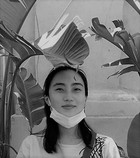 fellowship experience towards the last few days, I would not be exaggerating by saying that through the RCC Landhaus fellowship, I spent one of the most memorable and productive springs in this scenic Bavarian eco-farm residence. The well-equipped and spacious communal residence offered a tranquil space for individual researchers to dive into their research activities while also having the opportunity to have spontaneous collective exchanges and heartfelt dialogue. I have benefited greatly from this culturally diverse co-living researcher community through the daily conversations, walks, academic discussions and the many casual gatherings like board game and film nights. The eco-farm and nearby vast rural landscape also offer an opportunity to embrace a multispecies more-than-human community in which one has the luck to observe the colorful and lively flora and fauna of Bavaria. As environmental scholars, the residence definitely offers fruit for thought and practice including, but not limited to, organic food, animal ethics, rural-urban ecologies, etc. Last but not least, the very friendly and supportive research atmosphere, co-constituted by the RCC research facilities in urban Munich, as well as the extensive research communities connected through academic events and online communication, also proved very resourceful and beneficial for me. I believe the Landhaus fellowship experience will benefit researchers no matter their cultural backgrounds or their research stages.
fellowship experience towards the last few days, I would not be exaggerating by saying that through the RCC Landhaus fellowship, I spent one of the most memorable and productive springs in this scenic Bavarian eco-farm residence. The well-equipped and spacious communal residence offered a tranquil space for individual researchers to dive into their research activities while also having the opportunity to have spontaneous collective exchanges and heartfelt dialogue. I have benefited greatly from this culturally diverse co-living researcher community through the daily conversations, walks, academic discussions and the many casual gatherings like board game and film nights. The eco-farm and nearby vast rural landscape also offer an opportunity to embrace a multispecies more-than-human community in which one has the luck to observe the colorful and lively flora and fauna of Bavaria. As environmental scholars, the residence definitely offers fruit for thought and practice including, but not limited to, organic food, animal ethics, rural-urban ecologies, etc. Last but not least, the very friendly and supportive research atmosphere, co-constituted by the RCC research facilities in urban Munich, as well as the extensive research communities connected through academic events and online communication, also proved very resourceful and beneficial for me. I believe the Landhaus fellowship experience will benefit researchers no matter their cultural backgrounds or their research stages.

